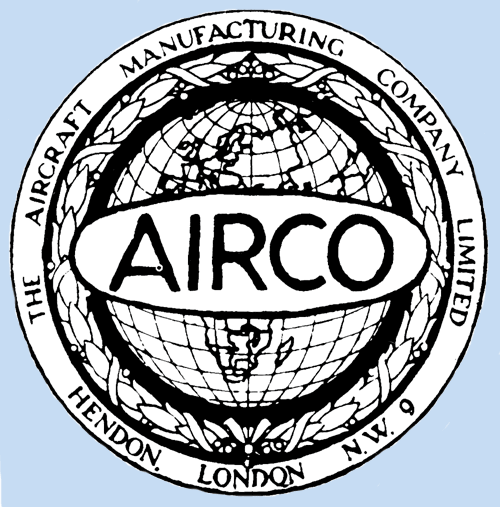|
Airco (circa 1912)

Aircraft Manufacturing
Company
Airco
George Holt Thomas was born on 31 March 1869 in Brixton
Hill, London, the seventh son of William and Annie Thomas. Brought up in Taplow, Oxfordshire and educated privately, he left
Queen’s College Oxford in 1890 after three years and without taking a degree. After he left university he joined his
father’s newspaper business as a director then became its general manager and later founded The Bystander with its comic
strip character and Empire Illustrated so making his own name and fortune.
During 1906 he became interested in
aviation. During a visit to France that year he had become associated with the Farman brothers Dick, Henri and Maurice, born
in Paris of English parents who were involved with newspapers. Thus inspired he spent considerable energy promoting the
cause of aviation in Britain, both civil and military, and it was he who persuaded the owners and management of Brooklands
to build an aerodrome within that racing circuit. Through the Farmans he engaged a French pilot, Louis Paulhan, to compete
for the £10,000 prize Holt Thomas’s friend Lord Northcliffe of the Daily Mail offered in 1906 for a successful
flight from London to Manchester, a distance far greater than anyone had then flown. In April 1910 Paulhan won the prize.
In 1911, Holt Thomas turned his attention to the manufacture of aircraft and aero-engines. He created the Aeroplane
Supply Company with premises at Merton in south-west London, and took up the sole British rights for the manufacture
of Farman machines. He also acquired the rights to manufacture Gnome and Le Rhone rotary engines. Holt Thomas also realized
the potential of the airship as military weapon, and he obtained the rights to copy the French Astra Torres design. For this
purpose he set up a parallel company, Airships Ltd. also based at Merton. The demise the Aeronautical Syndicate allowed the Aeroplane Supply Company to take over its vacant premises at Hendon in April 1912 and to acquire some of its
stock of aviation material that had not already been bought by Frederick Handley Page.
George Holt Thomas registered the Aircraft Manufacturing Company Ltd (AMC) on 6 June 1912 combining
the Aeroplane Supply Company and Airships Ltd. The Farman biplanes were the main product of the company in the years before
the First World War, being used as trainers by the Royal Flying Corps. Holt Thomas wanted to progress to building aircraft
of Airco’s own design and fortunately had met Geoffrey de Havilland during visits to the Royal Aircraft Factory. In early 1914, dissatisfied with his new position, de Havilland contacted Holt Thomas and joined Airco on May 23, 1914.
Throughout the war period Airco produced a series of aircraft to the design of de Havilland, all designated with his initials
D.H. For completeness, the aircraft designs of Airco are covered under de Havilland.
Holt Thomas diversified into all types of aircraft production. Peter Hooker Ltd. of Walthamstow,
a precision engineering company formerly producing printing equipment, was acquired. Hookers license-built the Gnôme
engine and were better known as The British Gnôme and Le Rhône Engine Co. This was followed by The Integral
Propeller Co., Ltd., of Upper Holloway, London, who moved to Holt Thomas’ new facility at the Hyde, Hendon,
during the latter part of 1915, and lastly May, Harden and May of Hythe, Southampton, manufacturers of flying
boat hulls. The latter came about when Airco received a contract for for Felixtowe F.2A flying boats. Some aircraft components were built by the coachbuilding company Vanden Plas which had also been bought
by Holt Thomas.
Following the cessation of hostilities the company's reliance on military orders, like so much
of the industry, became a handicap and the company became bankrupt in 1920. Its assets were bought by the Birmingham Small
Arms Company which did not pursue aviation-related business. However, the leading members of the Airco staff were convinced
there was a future for aviation and consequently bought the aviation related assets of the company, forming the de Havilland Aircraft Company on 20 September 1920.
Holt Thomas maintained an interest in his airline, Air Transport and Travel Ltd until it
was integrated into Imperial Airways on 1 April 1924, at which point he turned his back on aviation altogether.
George
Holt Thomas died at Cimiez near Nice, France on 1 January 1929.
As a postscript, Peter Hooker Ltd, also taken over
by BSA, went into voluntary liquidation in 1921, and was wound up in 1927. However, simultaneously a large order was received
for some thousands of pistons for the Armstrong Siddeley Jaguar engine. Armstrong Siddeley had no other capable source for
these pistons, so W.C. Devereux, works manager of Hookers, proposed to set up a new company to complete this order. John Siddeley loaned the money to re-purchase the necessary equipment and re-employ some of the staff from Hookers. As the buildings had
already been sold, the new company relocated to Slough as High Duty Alloys.
Company References
- Airco, the Aircraft Manufacturing Company, Mick Davis (The Crowood Press, 2001)
|





























